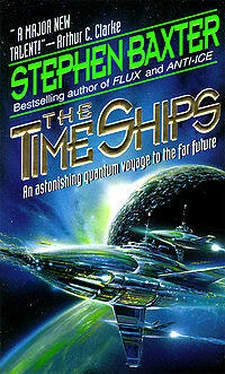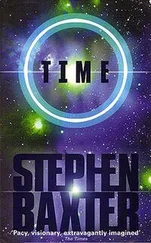“But what use,” I asked, “are these insectile limbs? One may push atoms about, and molecules — but why? What a tedious and unproductive business.”
“On the contrary,” he said wearily. “If you can do your engineering at the most fundamental level of matter — and if you have enough time, and sufficient patience — you can achieve anything.” He looked up at me. “Why, without the Constructors’ molecular engineering, you — and I — would not even have survived our first exposure to White Earth.”
“What do you mean?”
“The ’surgery’ performed on you,” Nebogipfel said, “was at the level of the cell — the level where the frost damage occurred…”
Nebogipfel described, in some grisly detail, how, in the severe cold we had encountered, the walls of my very cells (and his) had been burst open by the freezing and expansion of their contents — and no surgery, of the type I was familiar with, could have saved my life.
Instead, the microscopic outer limbs of the Constructor had become detached from the parent body, and had traveled through my damaged system, effecting repairs of my frost-bitten cells at the molecular level. When they reached the other side — crudely speaking — they had emerged from my body and rejoined their parent.
I had been rebuilt, from the inside out, by an army of swarming metal ants — and so had Nebogipfel.
I shuddered at this, feeling colder than at any time since my rescue. I scratched at my arms, almost involuntarily, as if seeking to scrape out this technological infection. “But such an invasion is monstrous,” I protested to Nebogipfel. “The thought of those busy little workers, passing through the substance of my body…”
“I take it you would prefer the blunt, invasive scalpels of the surgeons of your own age.”
“Perhaps not, but—?”
“I remind you that, by contrast, you could not even set a broken bone without rendering me lame.”
“But that was different. I’m no doctor!”
“Do you imagine this creature is? In any event, if you would prefer to have died, no doubt that could be arranged.”
“Of course not.” But I scratched at my skin, and I knew it would be a long time before I felt comfortable again in my own rebuilt body! I thought of a drop of comfort, though. “At least,” I said, “these limb-things of the Constructor are merely mechanical.”
“What do you mean?”
“They are not alive. If they had been—”
He pulled his face free of the Constructor and faced me, the hole in his face sparkling with metal cilia. “No. You are wrong. These structures are alive.”
“What?”
“By any reasonable definition of the word. They can reproduce themselves. They can manipulate the external world, creating local conditions of increased order. They have internal states which can change independently of external inputs; they have memories which can be accessed at will… All these are characteristics of Life, and Mind. The Constructors are alive, and conscious — as conscious as you or I. More so, in fact.”
Now I was confused. “But that’s impossible.” I indicated the pyramid-device. “This is a machine. It is manufactured.”
“I have encountered the limits of your imagination before,” he said severely. “Why should a mechanical worker be built within the limitations of the human design? With machine life—”
“Life?”
“ — one is free to explore other morphologies — other forms.”
I raised an eyebrow at the Constructor. “The morphology of the privet hedge, for example!”
“And besides,” he said, “it could manufacture you. Does that make you less than alive?”
This was becoming far too metaphysical a debate for me! I paced around the Constructor. “But if it is alive, and conscious — is this a person? Or several people? Does it have a name? A soul?”
Nebogipfel turned to the Constructor once more, and let the eye-scope nuzzle into his face. “A soul?” he asked. “This is your descendant. So am I, by a different History path. Do I have a soul? Do you?”
He turned away from me, and peered into the heart of the Constructor.
Later, Nebogipfel joined me in the chamber I had come to think of as the Billiards Room. He ate from a plate of cheese-like fare.
I sat, rather moodily, on the edge of the billiards table, flicking the single ball across the surface. The ball was wont to exhibit some peculiar behavior. I was aiming for a pocket on the far side of the table, and more often than not I hit it, and would trot around to retrieve it from its little net cache beneath. But sometimes the ball’s path would be disturbed. There would be a rattling in the middle of the empty table surface — the ball would jiggle about, oddly, too rapidly to follow — and then, usually, the ball would sail on to the destination I had intended. Sometimes, though, the ball would be diverted markedly from the path I had intended — and once it even returned, from that half-visible disturbance, to my hand!
“Nebogipfel, did you see that? It is most peculiar,” I said. “There does not seem to be any obstruction in the middle of the table. And yet, half the time, the running of this ball is impeded.” I tried some more demonstrations for him, and he watched with an air of distraction.
I said, “Well, I’m glad at any rate that I’m not playing a game here. I can think of one or two fellows who might come to blows over such discrepancies.” Tiring of my idle toying, I sat the ball square in the middle of the table and left it there. “I wonder what the motive of the Constructors was in placing this table in here. I mean, it’s our only substantial piece of furniture — unless you want to count our Constructor out there himself… I wonder if this is intended as a snooker or a billiards table.”
Nebogipfel seemed bemused by the question. “Is there a difference?”
“I’ll say! Despite its popularity, snooker is just a potting game — a fine enough pastime for the bored Army Officers in India who devised it but it has nothing like the science of billiards, to my mind…”
And then — I was watching it as it happened — a second billiard ball popped out of one of the table’s pockets, quite spontaneously, and began to roll, square on, towards my ball at rest at the centre of the table.
I bent closer to see. “What the devil is happening here?” The ball was progressing quite slowly, and I was able to make out details of its surface. My ball was no longer smooth and white; after my various experiments, its surface had become scarred with a series of scratches, one quite distinctive. And this new ball was just as scarred.
The newcomer hit my stationary ball, with a solid clunk; the new ball was brought to rest by the impact, and my ball was knocked across the table.
“Do you know,” I said to Nebogipfel, “if I didn’t know better, I would swear this ball, that has just emerged from nowhere, is the same as the first.” He came a little closer, and I pointed out that distinctive long scratch. “See that? I’d recognize this scar in the dark… The balls are like identical twins.”
“Then,” the Morlock said calmly, “perhaps they are the same ball.”
Now my ball, knocked aside, had collided with a cushion on the far side of the table and had rebounded; such was the nonregular geometry of the table that it was now heading back in the direction of the pocket from which the second ball had emerged.
“But how can that be? I mean, I suppose a Time Machine could deliver two copies of the same object to the same place — think of myself and Moses! — but I see no time travel devices here. And what would be the purpose?”
Читать дальше
Конец ознакомительного отрывка
Купить книгу









